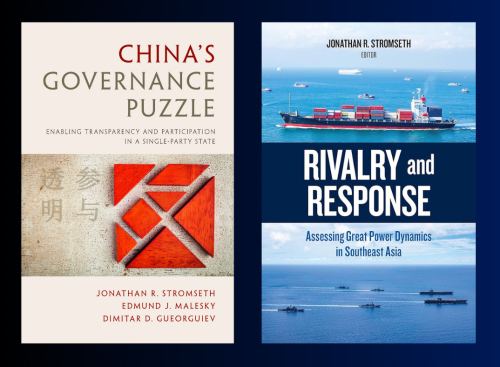
Brookings senior fellow joins Duke Sanford
Jonathan Stromseth brings his experience as a policymaker, development practitioner and scholar on U.S. Asia policy to Duke as a professor of the practice.
Jonathan Stromseth, a nonresident senior fellow at The Brookings Institution with a joint appointment in the Center for Asia Policy Studies and John L. Thornton China Center, joined Duke Sanford and the Duke Center for International Development in January 2024 as a professor of the practice.
Before joining Sanford, Stromseth worked at Brookings from 2017 as a senior fellow and the Lee Kuan Yew Chair in Southeast Asian Studies. Previously, he served on the Secretary of State’s Policy Planning Staff (2014-17), advising the State Department’s leadership on China, Southeast Asia, and East Asian and Pacific affairs. He also served as The Asia Foundation’s country representative to China (2006-14) and to Vietnam (2000-05), conducted research as a Fulbright Scholar in Singapore, worked for the United Nations peacekeeping operation in Cambodia, and taught Southeast Asian politics at Columbia University.
An expert on U.S. Asia policy and good governance

Stromseth, who earned a doctorate in political science from Columbia, where his studies focused on comparative politics and international relations in the Asia-Pacific region, is the co-author of “China’s Governance Puzzle: Enabling Transparency and Participation in a Single-Party State” and editor of “Rivalry and Response: Assessing Great Power Dynamics in Southeast Asia.” His publications include a multi-volume series on U.S.-Vietnam relations, as well as articles and reports on policymaking in Vietnam, geopolitical trends in Southeast Asia, Chinese foreign policy, and foreign aid cooperation in Asia.
His current research focuses on U.S. Asia policy in the context of escalating U.S.-China rivalry, particularly in Southeast Asia. “I’m especially interested to see how developing countries are navigating and responding to this great power competition — which is potentially perilous and destabilizing, but also can provide opportunities to hedge and secure benefits from the rival camps,” Stromseth says. “I’m also examining whether it’s still possible for Washington and Beijing to cooperate in addressing critical global challenges, like climate change, despite the current bilateral tensions and geopolitical competition.”
In addition, Stromseth’s research has focused on domestic governance reform in developing countries, including how good governance can contribute both to aid effectiveness and successful economic growth.
A new chapter at Duke
As a professor of the practice, Stromseth brings his experience and knowledge to the Master of International Development Policy program. He is currently teaching the graduate course “Special Topics in International Development: Chinese and U.S. Foreign Policy and ODA Architecture” and will teach “Globalization and Governance” in the fall.
“I am excited to have Jonathan join us here at DCID,” says Edmund Malesky, director of DCID and professor of political economy. “He brings a wealth of development policy and regional experience that will enrich the classroom experience for our MIDP fellows.”
In addition to teaching and advising students, Stromseth will further DCID’s outreach and project work with new initiatives and fundraising designed to mitigate climate change by promoting innovative climate approaches in the Asia-Pacific region.
“Jonathan has developed a global reputation for bringing nuance and pragmatic policy solutions to the thorniest of policy problems,” Malesky says. “We will benefit enormously from his insights.”
Five Questions with Jonathan
What are you looking forward to the most about joining Duke’s faculty?
I’m excited to join the Sanford School at Duke because my position, and my affiliation with DCID, lies at the intersection of foreign policy and international development cooperation. This feels like a sweet spot for me after many years as a development practitioner with The Asia Foundation in Vietnam and China, followed by my foreign policy work in Washington first at the Secretary of State’s Policy Planning Staff, and subsequently at the Brookings Institution. I’m also excited to engage with colleagues on the faculty, where there is such a wealth of policy expertise, as well as interact with students from all over the U.S. and the world.
What do you hope students will take away from your classes?
An appreciation for how domestic development challenges can be shaped, for the better or for the worse, by regional and global trends that can be hard to predict — but are important to try to gauge and better understand.
What is the most helpful advice you’ve received so far in your career?
Don’t get bogged down in office politics. It’s the same everywhere!
What movies do you recommend?
I like movies that transport me to another place, are unusually clever, or have an inventive and comedic take on history, even difficult history. Some of my favorites are "L.A. Confidential," "A River Runs Through It," "Parasite" and "Jojo Rabbit."
What is one thing you’re passionate about?
I grew up in Minnesota, where the winters are long and cold, and I started skiing not long after learning how to walk. I then became a ski instructor in my early teens, allowing me to ski for free at a local resort. Skiing has been a life-long passion ever since, and I’m especially happy when joined on the slopes by my wife and two daughters. I particularly like to ski steep groomers first thing in the morning, carving wide arcs in the fresh corduroy. It’s like zen to me.